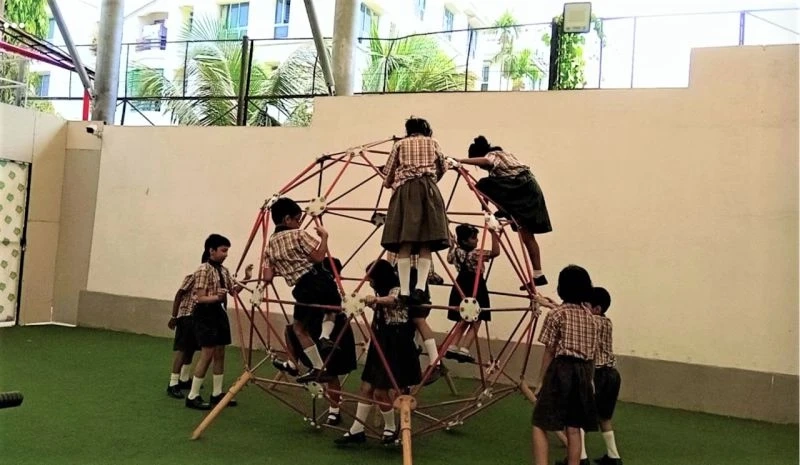Benefits of Outdoor Play for Children
Outdoor play offers numerous benefits for nursery school children's physical, cognitive, and emotional development. It provides a holistic learning experience for children, fostering their physical, cognitive, social, and emotional development while nurturing a lifelong connection with nature.
Outdoor play encourages children at a renowned primary school near me to engage in physical activities like running, jumping, climbing, and biking, which promote gross motor skills, strength, coordination, and overall fitness. It helps prevent sedentary behaviours and reduces the risk of obesity and related health problems.
Exposure to sunlight during outdoor play allows children to absorb vitamin D, which is essential for healthy bone development and helps prevent conditions like rickets. Vitamin D also supports the immune system and contributes to overall well-being.
The outdoor environment provides a rich sensory experience for children. They can feel different textures, hear various sounds, smell different scents, and see a range of colours and natural elements. This multisensory stimulation enhances their sensory processing skills, cognitive development, and overall sensory integration.
Outdoor play encourages problem-solving, critical thinking, and creativity. Children from the best CBSE school near Garia have opportunities to explore, experiment, and discover new things in their natural surroundings. They learn to observe, make connections, and develop their scientific inquiry skills by exploring plants, animals, and the environment.
Outdoor play also offers children the chance to assess risks and make decisions independently. They learn to navigate their environment, evaluate potential dangers, and develop risk management skills. This helps them build confidence, resilience, and self-esteem.
When they play outdoors, children connect with nature and develop an appreciation for the environment. They develop a sense of responsibility and learn the importance of conservation, sustainability, and protecting the natural world.
How does outdoor play impact physical & cognitive well-being?
Physical Well-being
Physical Fitness: Outdoor play encourages children and adults to engage in physical activities such as running, jumping, climbing, and cycling. These activities help improve cardiovascular fitness, strength, flexibility, and coordination.
Healthy Weight: Regular outdoor play helps burn calories and prevents sedentary behaviours, contributing to maintaining a healthy weight and reducing the risk of obesity.
Bone and Muscle Development: Outdoor play often involves weight-bearing activities like running and jumping, which promote the development of strong bones and muscles.
Gross Motor Skills: Outdoor environments provide opportunities for children to develop gross motor skills, such as balance, spatial awareness, and coordination, through activities like climbing on playground equipment or playing sports.
Cognitive Well-being
Creativity and Imagination: Outdoor play stimulates creativity and imagination as children have more space and freedom to explore their surroundings, invent new games, and engage in imaginative play.
Problem-Solving and Social Skills: Outdoor play often presents children at the best CBSE school near Garia with challenges and obstacles that require problem-solving skills. They learn to assess risks, make decisions, and find solutions independently or through collaborative play with peers. These social interactions foster the development of important social skills and emotional intelligence.
Sensory Stimulation: Natural outdoor environments provide a wide range of sensory experiences, including different textures, sounds, smells, and sights. These experiences enhance cognitive development, sensory integration, and perception.
Attention and Concentration: Spending time outdoors can improve attention and focus. Research suggests that exposure to nature can reduce mental fatigue and improve cognitive performance.
Outdoor Learning and Nature Activities for Preschoolers in India
Outdoor learning and nature activities at the best primary school near me are incredibly beneficial for preschoolers as they provide hands-on experiences, encourage curiosity, and foster a love for the environment. Our country is rich in biodiversity, and there are numerous opportunities to engage preschoolers in outdoor learning.
Nature Walks: Take preschoolers on guided nature walks in nearby parks, gardens, or nature reserves. Encourage them to observe and identify different plants, trees, insects, and birds. Point out interesting features and discuss their importance in the ecosystem.
Gardening: Set up a small garden within the preschool premises or in pots and encourage children to participate in planting and caring for various plants. They can learn about the life cycle of plants, different types of vegetables and flowers, and the importance of soil, water, and sunlight.
Nature Crafts: Collect natural materials like leaves, flowers, twigs, and pebbles during outdoor excursions. Use these materials to create nature-inspired crafts such as leaf rubbings, flower collages, or twig sculptures. This helps children appreciate the beauty of nature and enhances their creativity.
Sensory Exploration: Create sensory stations outdoors where children can explore different textures, smells, and sounds. Set up sandboxes, water play areas, and sensory gardens with different types of plants and flowers. Encourage them to touch, smell, and listen to the natural elements around them.
Nature Scavenger Hunt: Create a scavenger hunt by making a list of natural objects for children to find, such as different types of leaves, rocks, or flowers. This activity encourages observation skills and enhances their understanding of the natural environment.
Bird Watching: Introduce children to the fascinating world of birds. Set up bird feeders or provide binoculars for them to observe and identify various bird species. Teach them about the different colours, shapes, and sounds of birds and their importance in maintaining ecological balance.
Picnics and Outdoor Games: Plan regular picnics or outdoor play sessions where children can enjoy the fresh air and engage in physical activities like running, jumping, and playing games. Encourage games that involve nature themes or use natural materials as props.
Remember to prioritize safety during outdoor activities and ensure adult supervision at all times. Outdoor learning experiences provide valuable opportunities for nursery school preschoolers to develop a deep connection with nature while enhancing their cognitive, physical, and emotional development.


